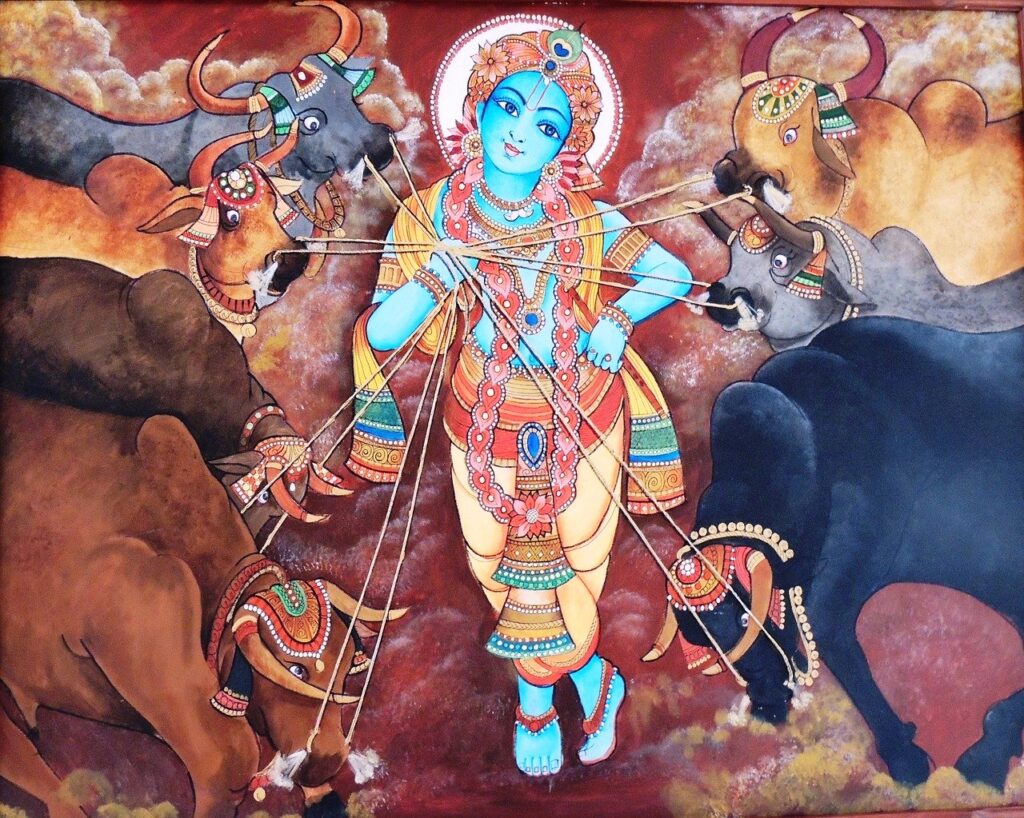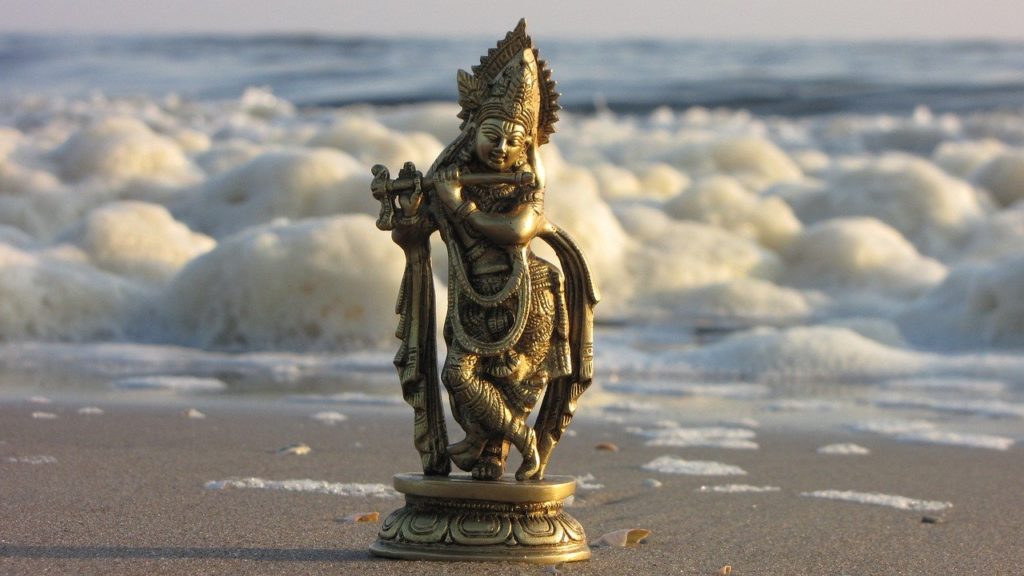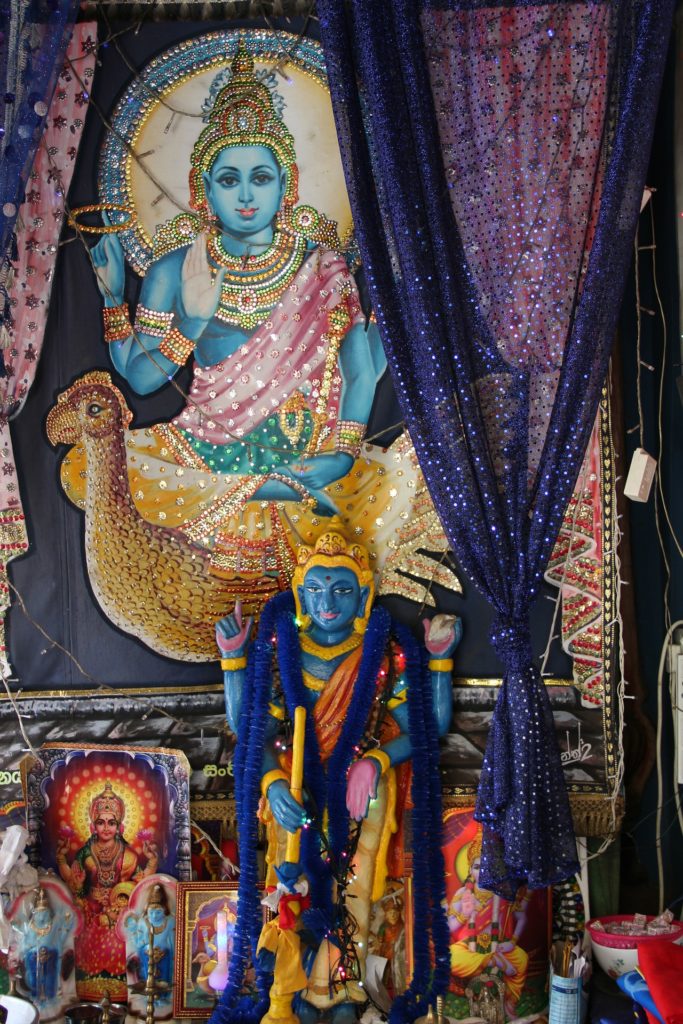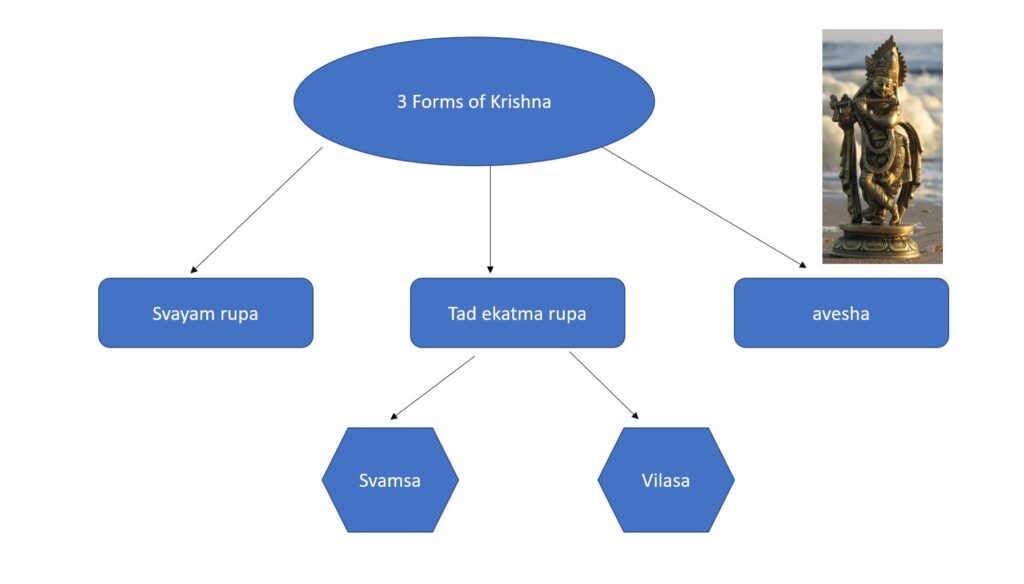
Srila Rupa Goswami explains in Laghu Bhagavatamrita that Krishna, the Supreme Lord, manifests three kinds of forms. These three kinds of forms are classified as – Svayam rupa, tad-ekatma-rupa, and avesha. Krishna, the Supreme Lord, can manifest Himself into unlimited forms without forsaking His essential oneness. This is confirmed throughout the Vedic scriptures.
Eko vasi sarva-gah Krishna idya
Eko pi san bahudha yo vibhati
(Gopala Tapani Upanishad, Purva 20)
–
Krishna is the supreme controller who exists everywhere and is worthy of worship. Although He is one, He appears as many.
Vishnu Purana (1.2.3) speaks of the Supreme Lord as ‘ekaneya swarupaya’ – You who have one identity and many. Srimad Bhagavatam (10.40.7) refers to Him ‘bahu murty eka murtikam’ – One Supreme Lord who manifests in multiple forms. The Supreme Lord transforms Himself without changing. There is no contradiction between the Vedic texts emphasizing His oneness and those highlighting His varieties.
#1 Svayam rupa
Svayam rupa form of the Supreme Lord does not depend on any other form for His manifestation. The word rupam in ‘Svayam rupa’ essentially means identity. Therefore ‘Svayam rupam’ indicates the Lord’s original form, which is self-manifested and not derived from any other reality. The following verse from Brahma Samhita reveals Krishna as the only ‘Svayam-rupa’.

Isvarah paramah Krsnah
Sac cid ananda vigrahah
Anadir adir govindah
Sarva karanah karanam
(Brahma Samhita 5.1)
–
Krishna, who is known as Govinda, is the Supreme Personality of Godhead. He has an eternal, blissful and spiritual form. He is the origin of all and has no other origin. He is the supreme cause of all causes.
#2 Tad ekatma rupa
Tad ekatma rupa are those forms of the Supreme that are non-different from Him but possess a difference in bodily features, activities, or transcendental emotions as compared to the Svayam rupa form (Krishna). Tad Eakatma rupa can further be divided into two – Vilasa and Svamsa.
#2.1 Vilasa
A Vilasa is that form of the Supreme that differs in qualities and features from ‘Svayam rupa’ but possesses almost an equal potency as the original form. Vilasa are expansions of Svayam rupa that manifest for performing certain unique pastimes. For example, Lord Narayana is a ‘Vilasa’ expansion of Krishna. Lord Vasudeva, similarly, is a ‘Vilasa’ of Narayana.

Vasudeva and Narayana are two different expansions of Krishna. Although both of them possess almost an identical physical appearance, having four arms and a dark blue complexion, they possess distinct mentalities. Vasudeva, who is a ‘vilasa’ of Naryana, considers Himself a servant of Narayana. He feels shy in the presence of Narayana, just as Bharata feels restrained from acting independently in front of His elder brother Ramachandra.
#2.2 Svamsa
‘Svamsa’ is also an expansion of the ‘Svayam rupa’, differing in features, qualities, transcendental emotions, etc. In addition, ‘Svamsa’ also possesses less potency than the Vilasa expansions. Among the Svamsas are Sankarshana, Matsya, and others. All the ‘svamsas’ forms of the Supreme manifest in their own spiritual abodes.
#3 Avesha
Exalted living entities whom the Supreme Lord empowers with a portion of His knowledge, strength, etc are known as Aveshas. We find Avesha forms of the Lord like Narada and Sanaka even in Vaikuntha (spiritual world). The four Kumaras, Maharaja Prithu, Parashurama, Lord Brahma, etc are all examples of ‘Aveshas’ of the Supreme Lord.

The power of knowledge was invested in the four Kumaras, the power of devotional service was invested in Narada, the power of creation was invested in Lord Brahma and the power to bear innumerable planets was invested in Lord Ananta.